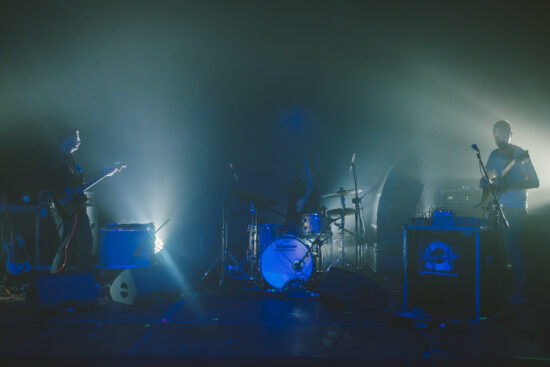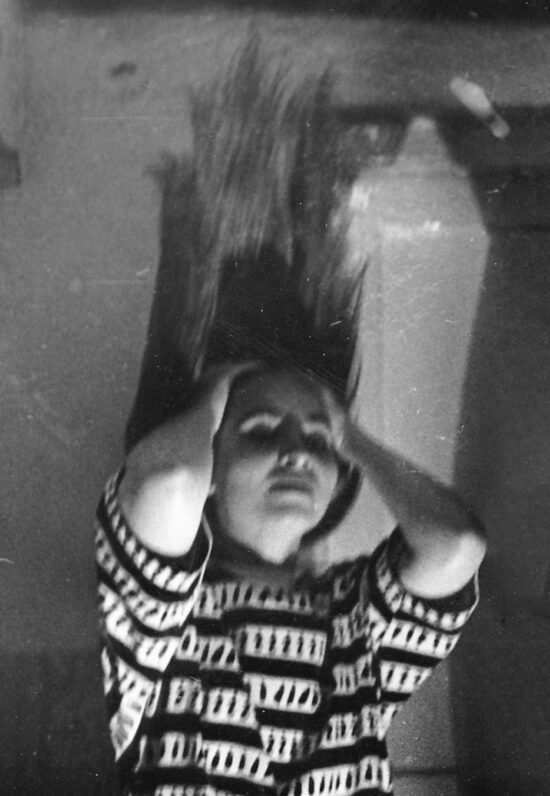Trypolis is a story dazzlingly told: with moving lyrics, delivered (i.e. shouted) in Marcin Pryt’s trademark style, musically complex, but coherent and distinctive at the same time. If the idea of concept albums may be kept alive, it’s on records such as this one: thought-out, fine-tuned, with texts that match the music, memorable on both the formal and emotional levels.
Translation: Aleksandra Szkudłapska
It’s been eight years since Tryp released their first record. Kochanówka, a poignantly witty concept album about the title mental asylum, whose patients were murdered under the Nazi T4 action of eliminating the mentally ill and disabled, was an outstanding and original work. Music-wise too, but above all in terms of the lyrics written by Marcin Pryt. Almost a decade later, concept albums are by no means back in fashion, but the Łódź outfit, which – apart from Pryt – includes Kuba Wandachowicz, Robert Tuta, Piotr Poloz, Marcin Zabrocki and Paweł Cieślak, who is responsible for the production, has again reached for this method. The result is comparably moving and singular. Trypolis, with the band’s name locked in the Libyan city (EN: Tripoli), tells the story of a mercenary the group allegedly met in one of Łódź’s establishments. The exact date of this encounter is unknown, as according to the booklet, the texts were written between 2010 and 2018. Yet irrespective of Maghreb landscapes, it’s the contemporary realities of Poland (and the post-industrial Łódź in particular) that will form a recurrent theme here, adding a universal aspect to the story.
The very concept is to die for, and will have you engrossed like an action movie. Tryp builds a vivid story of a traumatised man, with the music and lyrics delineating the map of his mind. The weight of this subject seems to be recounted rather lightly – on the streets of Łódź, the protagonist returning from the war-torn state looks like a modern hipster (his tan brought to mind holidays by the sea / his beard made him look quite fashionably), whom Pryt introduces spurting out words in a machine-gun fashion: he has no trouble killing for the first, the second, the third, the fourth time, irrespective of race and origin. This intro leaves no doubt as to the calibre of the story. Subsequent pieces serve as chapters/memories and a stern confrontation with reality. “Gauna” oozes depression, stagnation, and frustration in an attempt at capturing the human element in robotic actions on the frontlines (Mecha here, Gauna there / there’s no robots, only me), which bring nothing but emptiness. Marcin Pryt shouts it out bluntly like a hymn of sorts at the end of “Pustka” (”The Void”), with a reverb echo that underlines loneliness, trying to outshout the piercing, perfectly interlaced saxophone. A trip to the market square, with a postcard from Tripoli on one of the stalls, seems like a mirage. Łódź evokes the worst nightmares, only to help quash them in a moment (for a moment!) in “Expo2024” (I have forgotten about Libyan deserts / I walk around the beautiful park in bliss), which may be read, contrarily, as a commentary on local realities and policies followed by municipal leaders, who often resort to superficial actions instead of effecting any real change. Yet this reality cannot be overcome straight away – you have to face up to it, which Pryt brilliantly sums up in “Muamar” (Everyone has their own Mediterranean Sea / a space they have to swim across). The protagonist of Trypolis must in fact cross two seas: the real and the mental one, when he’s already away from the war. Yet his problems may be extrapolated to the society at large. A sense of limbo and lack of clear-cut answers is what the final “Trupolitania” (”Deathropolis”) brings: victory is hard to come by, the war trauma and clashing head-on with reality do not make anything easier and no new circumstances may change that (not even the hopeful encounter with a woman known from before the war in a typically Polish means of public transport in “Wróciłem” (”I’m Back”).
The brilliant lyrics are backed by a solid music layer. Almost the entire album has a very deliberate and rhythmical feel to it – the pulsating, sometimes march-like drums perfectly convey the aura of military recollections and nightmares. They are backed by Tuta and Wandachowicz’s guitars, a dense layer of bass later added by Piotr Połoz, and, finally, acid keyboards played by Marcin Zabrocki interchangeably with the saxophone. This production method is clearly audible and works in the album’s favour: the pieces are multi-layered, and each second is creatively filled (though not overpacked) with music. Cold synthesizers bring to mind new wave, aggressive drumming attracts the attention, while multiplied vocals, stylized to sound like an evocative quasi-choir, occasionally elevate the record to a rock-opera of sorts. This is as much a guitar-based (“Widzimy się” (”I’ll Be Seeing You”) as a dub album (“Trupolitania”), bubbling with ideas and yet very emotional. The record attacks listeners with music, and the broad array of instruments used paints a very accurate picture: individual pieces seem as chaotic as the traumatised protagonist’s mind; quivering, full of effects and distortions, like his memory. Tryp occasionally refer to oriental sounds, but this is merely an add-on – the gist of their sound is an industrial, metallic, overwhelming yet entrancing cacophony. In “Widzimy się”, rhymed texts interlock with dense bass, drums, and distinct keyboards. If the foreground offers a clear structure to the pieces, rhythm and synthesizer- or guitar-driven melodies, the background is equally eventful: each of the musicians has made a significant contribution, and this may be heard all the while. The desperate call in the finale is a post-production tour de force: Pryt’s fragmented vocals echo in the saxophone/synthesizer background, topped with a melody played on the glockenspiel.
Trypolis is a story dazzlingly told: with moving lyrics, delivered (i.e. shouted) in Pryt’s trademark style, musically complex, but coherent and distinctive at the same time. The lyrics hit the bull’s-eye, through shouts, simple yet clever rhymes, and a sense of overwhelming the listener. Music-wise, this is not an easy album to listen to: buzzing with emotion, with a multitude of threads administered carefully, consistently. From piercing melodies in “Trypolskie ABC” (”The ABC of Tripoli”) to the gloom and wailing in “Trupolitania”. If the idea of concept albums may be kept alive, it’s on records such as this one: thought-out, fine-tuned, with texts that match the music, memorable. The story told by Tryp is not an easy one, but they have managed to bring it home with candour and force. While this may not be your most consistent band, with Trypolis they have made an outstanding comeback, knowing perfectly what they want to say and how they want to do it.
Tryp, Trypolis, Requiem Records.
LISTEN: 🎶Spotify, 🎶Tidal, 🎶Deezer, 🎶Apple




